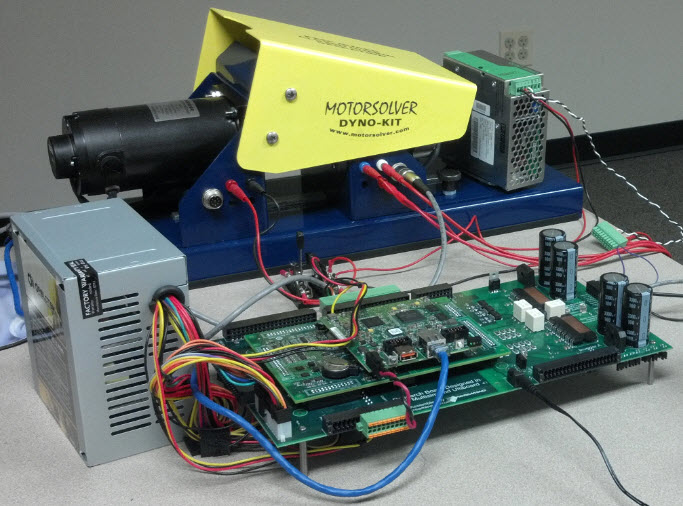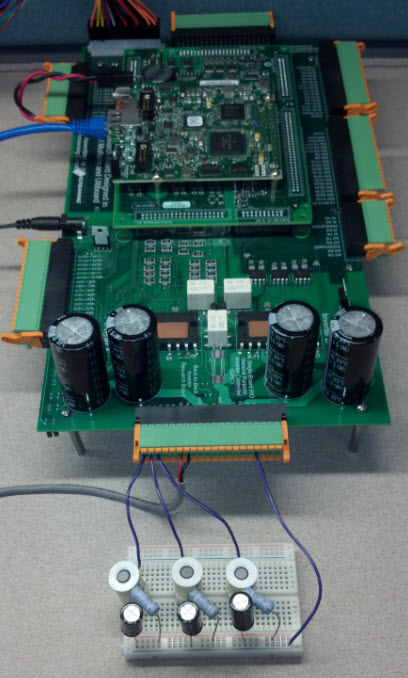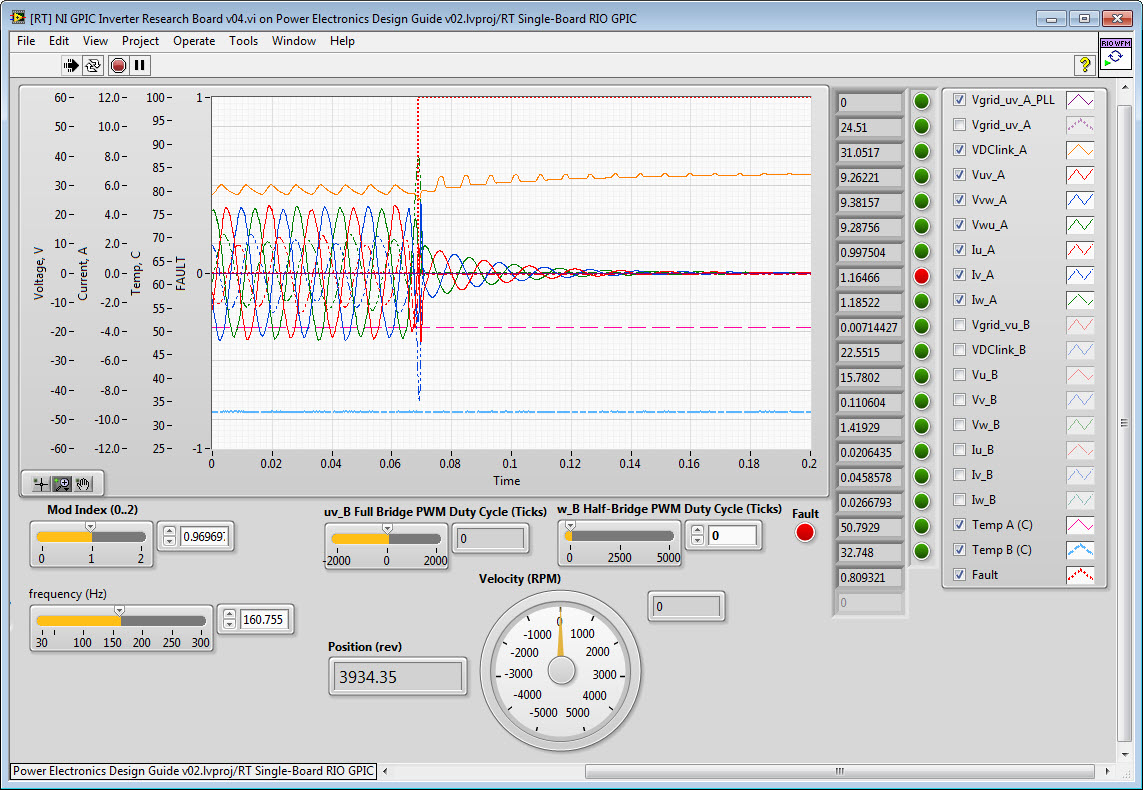- Subscribe to RSS Feed
- Mark Topic as New
- Mark Topic as Read
- Float this Topic for Current User
- Bookmark
- Subscribe
- Mute
- Printer Friendly Page
HANDS ON WORKSHOP, JAN. 22, 2013, Columbus Ohio - BUILD YOUR OWN EMBEDDED SYSTEM WORKSHOP: GRID TIED POWER CONVERTERS, MOTOR/GENERATOR INVERTERS AND FLEXIBLE AC TRANSMISSION SYSTEMS
01-09-2013 10:41 AM
- Mark as New
- Bookmark
- Subscribe
- Mute
- Subscribe to RSS Feed
- Permalink
- Report to a Moderator
Registration is free but will be offered on a first come, first serve basis and limited to 50 attendees due to the hands on nature of this workshop.
IEEE Power & Energy Society
Hands on Workshop
Tuesday, January 22, 2013, 8:00am – 6:00pm, Ohio State University
BUILD YOUR OWN EMBEDDED SYSTEM WORKSHOP:
GRID TIED POWER CONVERTERS, MOTOR/GENERATOR INVERTERS AND FLEXIBLE AC TRANSMISSION SYSTEMS



Learn an Improved Methodology for Model Based Design, Simulation and Deployment of FPGA-based Power Electronics Control Systems using Mini-scale 3-phase Inverters and LabVIEW Graphical Programming Tools
Attend this free, one day IEEE PES training workshop to boost your intuitive knowledge and understanding of smart grid power electronics control systems through the hands on use of mini-scale 3-phase power inverters, FPGA-based general purpose inverter control systems and NI LabVIEW graphical FPGA programming tools.
In this workshop, a new platform and methodology for system level design of FPGA-based smart grid power electronics control systems is introduced and demonstrated using hands-on training exercises. The feasibility, validity and accuracy of the approach are evaluated through the design and testing of actual grid tied inverters and power converters, with comparison of simulated versus measured results. Modern hybrid FPGA devices can be programmed graphically without requiring any knowledge of HDL languages and contain integrated DSP cores within the chip to provide 40 times higher performance per dollar compared to conventional DSPs and microprocessors.
The workshop is based on a new open-source 3-phase back-to-back inverter power electronics research system for experiential learning, teaching and mini-scale rapid prototyping of modern FPGA-based power system designs. You will learn how to use new co-simulation tools to accurately capture the high-speed, coupled dynamic interaction between FPGA software and the switched mode power circuit. Additionally, an FPGA-based real-time hardware-in-the-loop (HIL) state-space simulator will be demonstrated which enables exhaustive validation testing of the physical power converter and control system.
The presentation will be of particular interest to all engineering professionals, students and researchers interested in smart grid and utility power applications. Topics include principles of 3-phase power analysis, fundamentals of grid-tied power converters, basics of induction motor inverter control, and the design of smart power flow controllers for flexible AC transmission systems (FACTS). This includes active and reactive power compensation; traditional FACTS controllers – voltage regulating transformer, phase angle regulator, shunt inductor/capacitor, and series inductor/capacitor; voltage-sourced converter (VSC) – 2-level and 3-level poles; 6-pulse, 12-pulse, 24-pulse, and 48-pulse harmonic neutralized VSCs; PWM VSC, VSC-based technology and its implementation, comparison of simulation and field results; special applications of VSC-based technology; Sen Transformer.
The required background is a basic familiarity with power engineering and LabVIEW graphical programming concepts. If you are new to LabVIEW, we recommend preparing by completing the 3 Hour LabVIEW Introduction Course, which can be downloaded from here:
http://www.ni.com/academic/labview_training/
Agenda
8:00 - 9:00 AM | Keynote: Forecasting a Digital Energy Revolution: Modeling the Exponential Improvement of Power Electronics to Forecast the Future of the Smart Grid |
9:15 - 10:00 AM | Fundamentals of FPGA-based Voltage Source Converter Control and Co-Simulation |
10:00 - 11:30 AM | Hands On: Learn LabVIEW Graphical Programming and Voltage Source Power Converter Design using FPGA Co-Simulation |
11:30 - 12:00 PM | Real-Time Processor and FPGA-based Embedded Systems 101 |
12:00 - 1:00 PM | Lunch Break |
1:00 - 1:30 PM | Fundamentals of 3-Phase Power, One-Line Diagrams and Power Quality Analysis |
1:30 - 2:30 PM | Hands On: Deploy your own Grid-Tied 3-Phase Power Inverter and Analyze the Power Quality |
2:30 - 4:00 PM | Fundamentals of Flexible AC Transmission Systems (FACTS): Controlling the Flow of Power in Transmission and Distribution |
4:00 - 4:30 PM | Hands On: Implementation of Power Flow Control Systems |
4:30 - 5:00 PM | Understanding 3-Phase Motor/Generators |
5:00 - 5:30 PM | Hands On: 3-Phase Induction Motor Control |
5:30 - 6:00 PM | Wrap Up Q&A and Discussion |
Location
Ohio State University
Caldwell Laboratory, Room 235/237 "ECE Open Spaces" Lab
2024 Neil Ave.
Columbus OH, 43210
Speakers
Kalyan Sen is the Chief Technology Officer of Sen Engineering Solutions, Inc. (www.sentransformer.com) that specializes in developing SMART power flow controllers. He spent 26 years in academia and industry and became a Westinghouse Fellow Engineer. He was a key member of the Flexible Alternating Current Transmission Systems (FACTS) development team at the Westinghouse Science & Technology Center in Pittsburgh, USA. He contributed in all aspects (conception, simulation, design, and commissioning) of FACTS projects at Westinghouse. He conceived some of the basic concepts in FACTS technology. He has over 25 patents and publications in the areas of FACTS and power electronics. He is the coauthor of the book titled, Introduction to FACTS Controllers: Theory, Modeling, and Applications, IEEE Press and John Wiley & Sons, Inc. 2009, which is now translated in Chinese. He has also coauthored a book titled, Power System Transients, UNESCO, in print. He is the co-inventor of the Sen Transformer for FACTS applications. He introduced the term SMART Power Flow Controller. He received BEE, MSEE, and PhD degrees, all in Electrical Engineering, from Jadavpur University, India, Tuskegee University, USA, and Worcester Polytechnic Institute, USA, respectively. He also received an MBA from Robert Morris University, USA. He is a licensed Professional Engineer in the Commonwealth of Pennsylvania. Kalyan, a Senior Member of IEEE, has served the organization in many positions. In 2003, he reestablished the Pittsburgh Chapters of the Power & Energy Society (PES) and the Industry Applications Society (IAS). Both Chapters received the “Outstanding Large Chapter” awards for their activities in 2004. Under his Chairmanship, the Pittsburgh Section received the “Outstanding Large Section” award for its activities in 2005. His other past positions include Editor of the IEEE Transactions on Power Delivery (2002 through 2007), Technical Program Chair of the 2008 PES General Meeting in Pittsburgh, Chapters and Sections Activities Track Chair of the 2008 IEEE Sections Congress in Quebec City, Canada, and the PES Region 2 Representative (2010 and 2011). He has been serving as an IEEE PES Distinguished Lecturer since 2002. In that capacity, he has given presentations on power flow control technology in over 50 places around the world.
Brian MacCleery is the Principal Product Manager for Clean Energy Technology at National Instruments. Brian’s mission is to facilitate the design, prototyping and deployment of advanced embedded systems technologies that will help make clean energy less expensive and more abundant than fossil fuels. MacCleery holds bachelors and masters degrees in electrical engineering from Virginia Tech where he completed his graduate research in electromechanical modeling and simulation and led multidisciplinary student teams in the development of novel magnetic levitation and propulsion machine designs for energy efficient rapid transit. Brian works with both universities and green engineering companies worldwide to help them accelerate their research and commercialization process through the use of high-level graphical programming software and cutting edge reconfigurable embedded instrumentation and control hardware. The digitization of energy technology, enabled by exponential improvements in the performance per dollar of power transistors and digital control systems, enables us to convert, control, manipulate and store large amounts of electric energy with high efficiency. In consultation with researchers and commercial design engineers, MacCleery leads the R&D initiatives at NI to develop a comprehensive new tool chain for power electronics with the goal of enabling significant improvements in the design, prototyping, and deployment process for commercialization of new digital energy products and systems. In his thirteen year tenure at NI, MacCleery led the product definition, launch and growth of the NI CompactRIO product lines, programmable automation controller (PAC) and mechatronics initiatives and the development of the NI industrial-embedded business segment.

